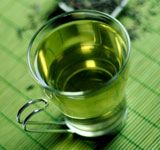Article
Green Tea May Weaken Effect of Nadolol
Author(s):
A preliminary study in healthy young volunteers found that drinking green tea reduced the blood pressure-lowering effect of a single dose of nadolol.

A preliminary study in healthy young volunteers found that drinking green tea reduced the plasma concentration of nadolol and thus the systolic blood pressure-lowering effect of the medication.
The study, published in the January 13, 2014, issue of Clinical Pharmacology & Therapeutics, showed that the blood-pressure-lowering effect of a single dose of nadolol was weaker after volunteers had about two cups per day of green tea for two weeks than after they had been drinking the same amount of water for two weeks.
Shingen Misaka, MD, of Fukushima University in Japan, and fellow researchers also showed that in cell-culture experiments, green tea appears to inhibit an organic anion-transporting polypeptide (OATP1A2) in the intestinal epithelium, which is thought to be at least partially responsible for transporting nadolol into the cells.
The study enrolled eight men and two women, 20 to 30 years of age, with a body mass index of 18.3 to 23.9 kilogram/square meter, who were nonsmokers and not taking any medications. The randomized, crossover study was separated by a two-week washout period. Subjects were randomized to drink either 700 mililiter/day of green tea or water. They received a single dose of 30 milograms of nadolol. During two days of follow-up, blood and urine tests were conducted and blood pressure and heart rate measurements were made.
Subjects who consumed green tea rather than water during the two weeks prior to taking nadolol had plasma concentrations of the drug that were reduced by 76 percent. There was great inter-individual variability in how much green tea suppressed the effect of nadolol.
Average systolic BP at baseline was 114 mmHg; average diastolic BP was 71 mmHg. After a single dose of nadolol, the maximum decreases from baseline in these measures were 12% and 11%, respectively, when the subjects drank water. These effects (especially the effect on systolic BP) were weakened after subjects had been randomized to drinking green tea.





